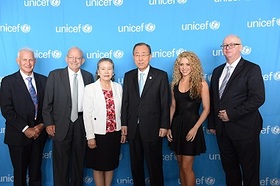UNICEF Goodwill Ambassador Shakira today urged global leaders to invest heavily in early childhood development in the wake of new science that is creating a revolutionary shift in our understanding of the lasting effects of deprivation and stress on the developing brains of young children.

Credit/Copyright: UNICEF/NYHQ2015-2283/Markisz
“More than 100 million children are out of school and 159 million boys and girls under five are physically and cognitively stunted due to a lack of care and proper nutrition,” said Shakira. “Every year that passes without us making significant investment in early childhood development and initiatives that address these issues, millions of kids will be born into the same cycle of poverty and lack of opportunity.”
“UNICEF and I have joined forces and are here today because investing early in children is an urgent matter and there isn’t another moment to lose,” she added.
Brain development is most intense during early childhood, with nearly 1,000 neural connections happening every second. These early synaptic connections form the basis of a child’s health and wellbeing, including the lifelong capacity to learn, adapt to change, and handle adversity. Yet nearly one-third of all children under 5 years of age in lower and middle income countries are growing up in environments and situations that can interfere with this period of rapid growth and development.
New scientific research shows that the developing brains of young children are as affected by environmental factors as they are by genetics. Inadequate nutrition, lack of stimulation, and toxic stress all can have a negative impact on brain development. But it also shows that early, cost-effective interventions, such as encouraging breast feeding, or reading and playing with young children, as well as formal early education programmes, all support healthier brain development.
These findings have significant implications for children growing up in extreme poverty, exposed to domestic violence, or in countries affected by conflict and other crises. And these effects on the developing brain can actually alter the expression of genes, potentially affecting the next generation.
“What we are learning about all the elements that affect a child’s brain – whether her body is well nourished, whether her mind is stimulated, whether she is protected from violence – must change the way we think about early childhood development, and how we act,” said UNICEF Executive Director Anthony Lake. “To give every child a fair chance in life, we need to invest early, invest equitably, and invest smartly – not only in education, but in health, in nutrition, and in protection.”
Evidence increasingly points to investment in early childhood as one of the most cost-effective ways to achieve sustainable development. A study on increasing pre-school enrolment in 73 countries found higher future wages of $6 – $17 per dollar invested, indicating potential long-term benefits ranging from $11 to $34 billion.
Cost-benefit ratios show that for every dollar spent on improving early child development, returns can be on average 4 to 5 times the amount invested, and in some cases, much higher.
Shakira was joined by United Nation Secretary General Ban Ki-moon, UNICEF Executive Director Anthony Lake, Dr. Jack P. Shonkoff, Director of the Harvard University Center on the Developing Child, and business leaders for a private event on early childhood development at the UN in New York.
The event preludes this week’s announcement of the new Sustainable Development Goals, which will officially include early childhood development as part of the transformative agenda for 2015 and beyond. Early childhood development provides a natural link between the new global goals, producing a multiplier effect that can help address poverty, improve health and nutrition, promote gender equality, and reduce violence.
“Turning this new understanding into action can be life-changing for millions of the most disadvantaged children,” said Lake. “The knowledge is irrefutable. The moral argument is strong. The investment case is persuasive. The SDG momentum is with us. And the power to act is in our hands.”





